外研版九年级下册Module 4 Rules and suggestions Unit 3 Revision课件(共18张PPT,内嵌音频)
文档属性
| 名称 | 外研版九年级下册Module 4 Rules and suggestions Unit 3 Revision课件(共18张PPT,内嵌音频) | 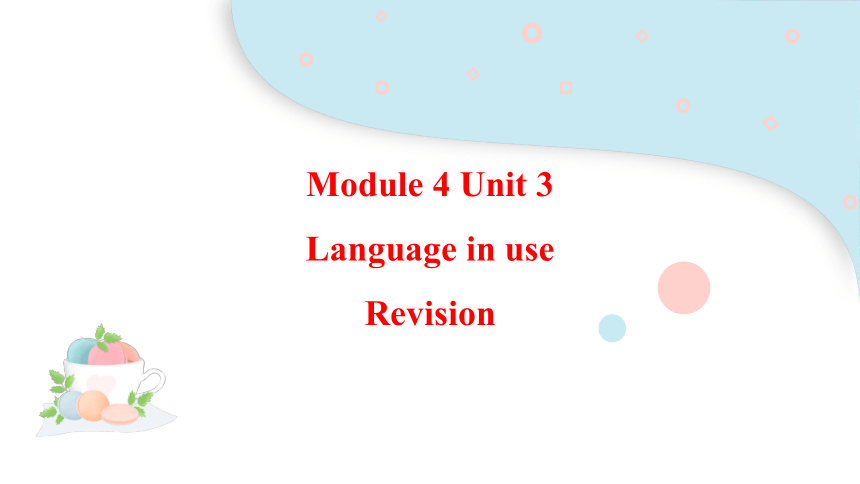 | |
| 格式 | pptx | ||
| 文件大小 | 2.8MB | ||
| 资源类型 | 教案 | ||
| 版本资源 | 外研版 | ||
| 科目 | 英语 | ||
| 更新时间 | 2025-04-27 20:20:46 | ||
图片预览

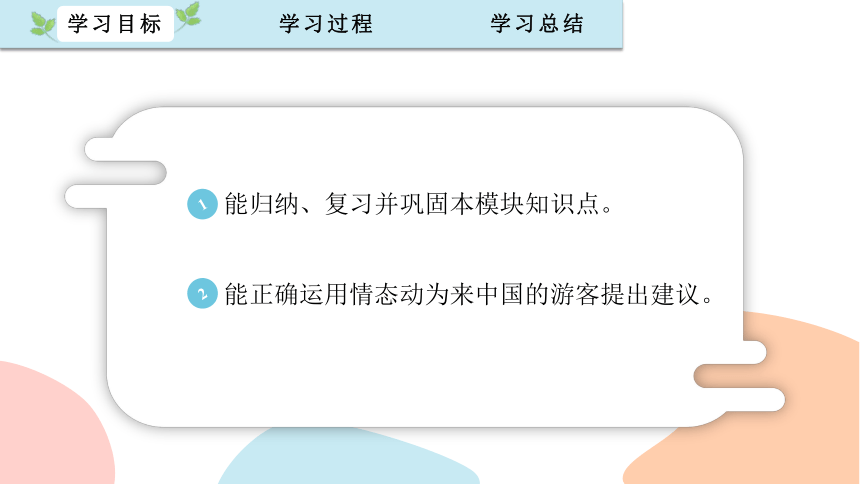
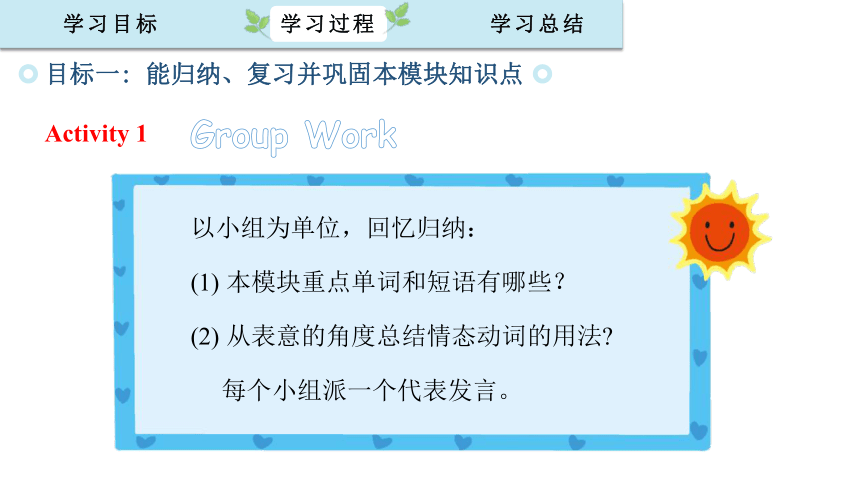
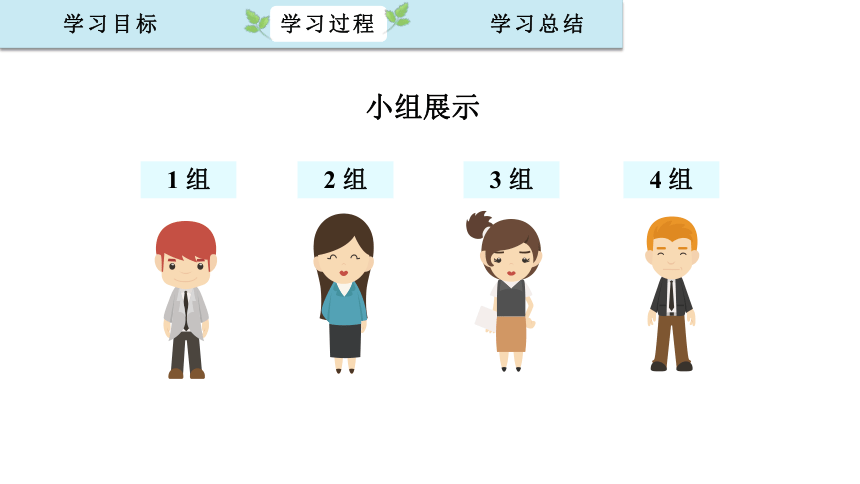
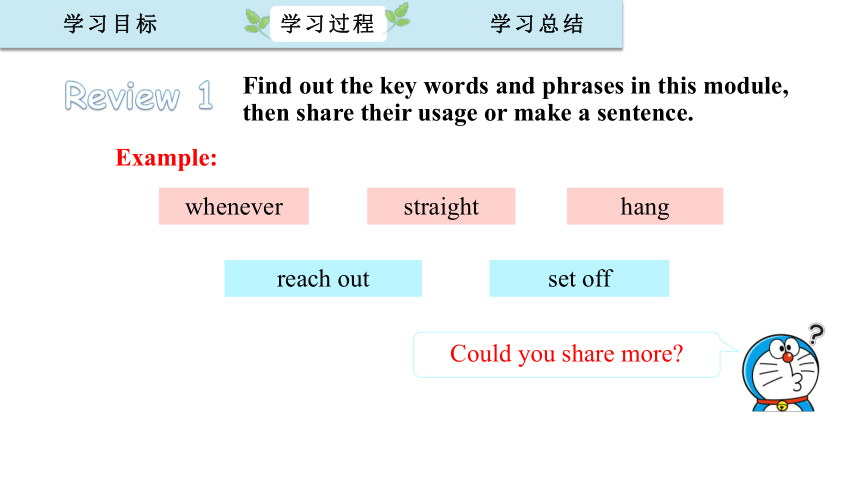


文档简介
(共18张PPT)
Module 4 Unit 3
Language in use
Revision
1
2
能正确运用情态动为来中国的游客提出建议。
能归纳、复习并巩固本模块知识点。
Activity 1
Group Work
以小组为单位,回忆归纳:
(1) 本模块重点单词和短语有哪些?
(2) 从表意的角度总结情态动词的用法
每个小组派一个代表发言。
目标一: 能归纳、复习并巩固本模块知识点
1 组
2 组
3 组
4 组
小组展示
Find out the key words and phrases in this module, then share their usage or make a sentence.
Review 1
Could you share more
whenever
reach out
set off
straight
Example:
hang
Review 2
1. 表示能力
表示一个人能做某事时,常用can或could表达。
2.表示可能性
如果要表达“可能,可能性”,可以用may / might 或 can / could。
3.表示许可或征求对方许可
如果表达允许某人做某事,或征求对方的许可,可以用can / could / may / might。
4.表示请求对方做某事
如果要请求对方做某事,可以用下列表达方式:
Will / Would / Could you (please) …
Would you mind …
5.表示建议和邀请
表建议和邀请可用下列表达方式:
Would you like (to) …
Shall we …
6.表示意愿
表示想做某事可以用would like / love to …
7.表示应该、义务
表示应该、义务等时常用should, ought to, must。
8.表示命令、禁止、不得不
表示这类含义时,一般用must, mustn't, have to等。
9.表示没必要做某事
表示没必要做某事时,常用needn't, don't have to等。
3
Complete the passage with the correct form of the words in the box.
Activity 2
although keep stream tourist worry
People are very (1) _______ about the conditions of the ancient forests of Canada and want to save them. Many visitors to the forests use knives to cut their names into the trees, some of which are hundreds of years old.
(2) ________ there are litter bins, people still throw rubbish into the (3) ______ and this causes plants and fish to die.
People from local villages have helped clean up the forests. We hope (4) _______ will play their part in (5) _______ Canada’s forests clean too!
worried
Although
streams
tourists
keeping
1. You should ____________________________________.
2. You shouldn’t __________________________________.
3. You must ______________________________________.
4. You mustn’t ____________________________________.
help clean up the forests
throw rubbish into the streams
take your rubbish home
cut your names into the trees
Now write possible rules for visitors to the forests.
5
Complete the sentences with the words in the box.
gun smooth sticks stone sudden tent whenever
1. Come and visit me _________ you have time.
2. The wall is made of ______.
3. The path to the top is not very _______.
4. Remember to take a ____ with you to sleep in, because it might rain.
5. He lifted up the _____ and pointed it at the bear.
6. There was a ______ noise in the woods and we all stopped moving.
7. Birds use small ______ and leaves to make a home.
whenever
stone
smooth
tent
gun
sudden
sticks
Discussion
What can we do to protect our earth
Do you have some suggestions
water pollution
air pollution
rubbish pollution
Activity 3
Read the passage and answer the questions.
1. What does Zhang Wenpeng try to say with his drawing
2. What does Zhou Zhiyun try to say with his painting
3. What does the school suggest the students should do
4. How can a school become a “green school”
Pollution is causing damage to the progress we’ve made.
People must not waste electricity.
Students should pass on what they have learnt at school to their parents and neighbours.
A school must include education about the environment as part of the timetable.
Listen and complete the sentences.
1. The first thing you have to do is to ______________ carefully.
2. Think about where ____________________ and whether there are
___________________.
3. You should only take marked _________.
4. Make sure you know where ___________ for lunch.
5. Don’t forget to tell people to _________ for the picnic.
6. Don’t walk when it is ________ or in _________________.
7. You must not try out a ___________ with a group.
plan the walk
you are going to walk
clearly marked paths
paths
you can stop
bring food
too hot
very bad weather
new walk
目标二:能正确运用情态动为来中国的游客提出建议
Module Task: Writing advice for visitors to China.
Step 1: Work in pairs. Discuss and give advice for visitors to China. Talk about:
visiting someone’s home
eating and drinking
visiting tourist sights
travelling on public transport
behaving politely in public
Step 2: Write your advice.
You must…
You mustn’t…
You should…
You shouldn’t…
Step 3: Work in groups and compare your advice. Choose the five most useful pieces of advice for visitors to China.
What have you learned in Module 4
Around the world
Ecotourism
Ecotourism is also known as “responsible tourism”. It means you visit places without damaging the environment. Many countries around the world have started ecotourism holidays and trips. Tourists help the local communities look after their natural environment. Here are some rules of ecotourism.
Dos
Take rubbish away with you.
Walk on paths or roads.
Take photos but nothing else.
Don’ts
Don’t pick flowers or damage trees.
Don’t pollute rivers or streams.
Don’t make open fires in the forests.
Module 4 Unit 3
Language in use
Revision
1
2
能正确运用情态动为来中国的游客提出建议。
能归纳、复习并巩固本模块知识点。
Activity 1
Group Work
以小组为单位,回忆归纳:
(1) 本模块重点单词和短语有哪些?
(2) 从表意的角度总结情态动词的用法
每个小组派一个代表发言。
目标一: 能归纳、复习并巩固本模块知识点
1 组
2 组
3 组
4 组
小组展示
Find out the key words and phrases in this module, then share their usage or make a sentence.
Review 1
Could you share more
whenever
reach out
set off
straight
Example:
hang
Review 2
1. 表示能力
表示一个人能做某事时,常用can或could表达。
2.表示可能性
如果要表达“可能,可能性”,可以用may / might 或 can / could。
3.表示许可或征求对方许可
如果表达允许某人做某事,或征求对方的许可,可以用can / could / may / might。
4.表示请求对方做某事
如果要请求对方做某事,可以用下列表达方式:
Will / Would / Could you (please) …
Would you mind …
5.表示建议和邀请
表建议和邀请可用下列表达方式:
Would you like (to) …
Shall we …
6.表示意愿
表示想做某事可以用would like / love to …
7.表示应该、义务
表示应该、义务等时常用should, ought to, must。
8.表示命令、禁止、不得不
表示这类含义时,一般用must, mustn't, have to等。
9.表示没必要做某事
表示没必要做某事时,常用needn't, don't have to等。
3
Complete the passage with the correct form of the words in the box.
Activity 2
although keep stream tourist worry
People are very (1) _______ about the conditions of the ancient forests of Canada and want to save them. Many visitors to the forests use knives to cut their names into the trees, some of which are hundreds of years old.
(2) ________ there are litter bins, people still throw rubbish into the (3) ______ and this causes plants and fish to die.
People from local villages have helped clean up the forests. We hope (4) _______ will play their part in (5) _______ Canada’s forests clean too!
worried
Although
streams
tourists
keeping
1. You should ____________________________________.
2. You shouldn’t __________________________________.
3. You must ______________________________________.
4. You mustn’t ____________________________________.
help clean up the forests
throw rubbish into the streams
take your rubbish home
cut your names into the trees
Now write possible rules for visitors to the forests.
5
Complete the sentences with the words in the box.
gun smooth sticks stone sudden tent whenever
1. Come and visit me _________ you have time.
2. The wall is made of ______.
3. The path to the top is not very _______.
4. Remember to take a ____ with you to sleep in, because it might rain.
5. He lifted up the _____ and pointed it at the bear.
6. There was a ______ noise in the woods and we all stopped moving.
7. Birds use small ______ and leaves to make a home.
whenever
stone
smooth
tent
gun
sudden
sticks
Discussion
What can we do to protect our earth
Do you have some suggestions
water pollution
air pollution
rubbish pollution
Activity 3
Read the passage and answer the questions.
1. What does Zhang Wenpeng try to say with his drawing
2. What does Zhou Zhiyun try to say with his painting
3. What does the school suggest the students should do
4. How can a school become a “green school”
Pollution is causing damage to the progress we’ve made.
People must not waste electricity.
Students should pass on what they have learnt at school to their parents and neighbours.
A school must include education about the environment as part of the timetable.
Listen and complete the sentences.
1. The first thing you have to do is to ______________ carefully.
2. Think about where ____________________ and whether there are
___________________.
3. You should only take marked _________.
4. Make sure you know where ___________ for lunch.
5. Don’t forget to tell people to _________ for the picnic.
6. Don’t walk when it is ________ or in _________________.
7. You must not try out a ___________ with a group.
plan the walk
you are going to walk
clearly marked paths
paths
you can stop
bring food
too hot
very bad weather
new walk
目标二:能正确运用情态动为来中国的游客提出建议
Module Task: Writing advice for visitors to China.
Step 1: Work in pairs. Discuss and give advice for visitors to China. Talk about:
visiting someone’s home
eating and drinking
visiting tourist sights
travelling on public transport
behaving politely in public
Step 2: Write your advice.
You must…
You mustn’t…
You should…
You shouldn’t…
Step 3: Work in groups and compare your advice. Choose the five most useful pieces of advice for visitors to China.
What have you learned in Module 4
Around the world
Ecotourism
Ecotourism is also known as “responsible tourism”. It means you visit places without damaging the environment. Many countries around the world have started ecotourism holidays and trips. Tourists help the local communities look after their natural environment. Here are some rules of ecotourism.
Dos
Take rubbish away with you.
Walk on paths or roads.
Take photos but nothing else.
Don’ts
Don’t pick flowers or damage trees.
Don’t pollute rivers or streams.
Don’t make open fires in the forests.
同课章节目录
- Module 1 Travel
- Unit 1 We toured the city by bus and by taxi
- Unit 2 It's a long story.
- Unit 3 Language in use
- Module 2 Education
- Unit 1 They don't sit in rows.
- Unit 2 What do I like best about school?
- Unit 3 Language in use
- Module 3 Life now and then
- Unit 1 They sometimes work harder.
- Unit 2 I think life is better today.
- Unit 3 Language in use.
- Module 4 Rules and suggestions
- Unit 1 You must be careful of falling stones.
- Unit 2 we must keep the camp clean.
- Unit 3 Language in use.
- Revison A
- Module 5 Look after yourself
- Unit 1 We'd better get you to hospital.
- Unit 2 Get off the sofa!
- Unit 3 Language in use.
- Module 6 Eating togethe
- Unit 1 When is the school-leavers' party?
- Unit 2 Knives and forks are used for most Western
- Unit 3 Language in use
- Module 7 English for you and me
- Unit 1 Have you ever been to an English corner?
- Unit 2 We all own English.
- Unit 3 Language in use
- Module 8 My future life
- Unit 1 Here's to our friendship and the future
- Unit 2 I know that you will be better at maths.
- Unit 3 Language in use
- Revison B
